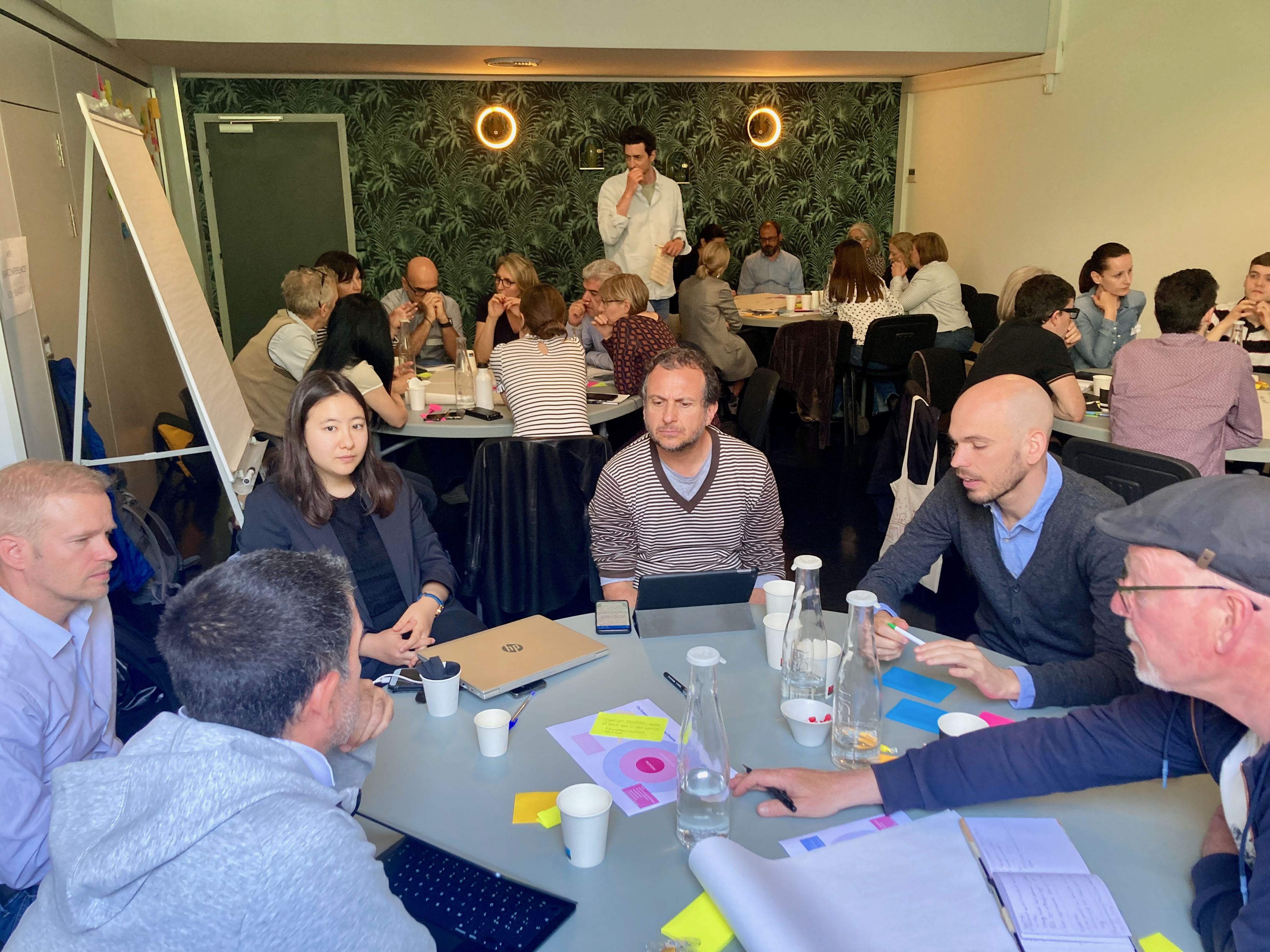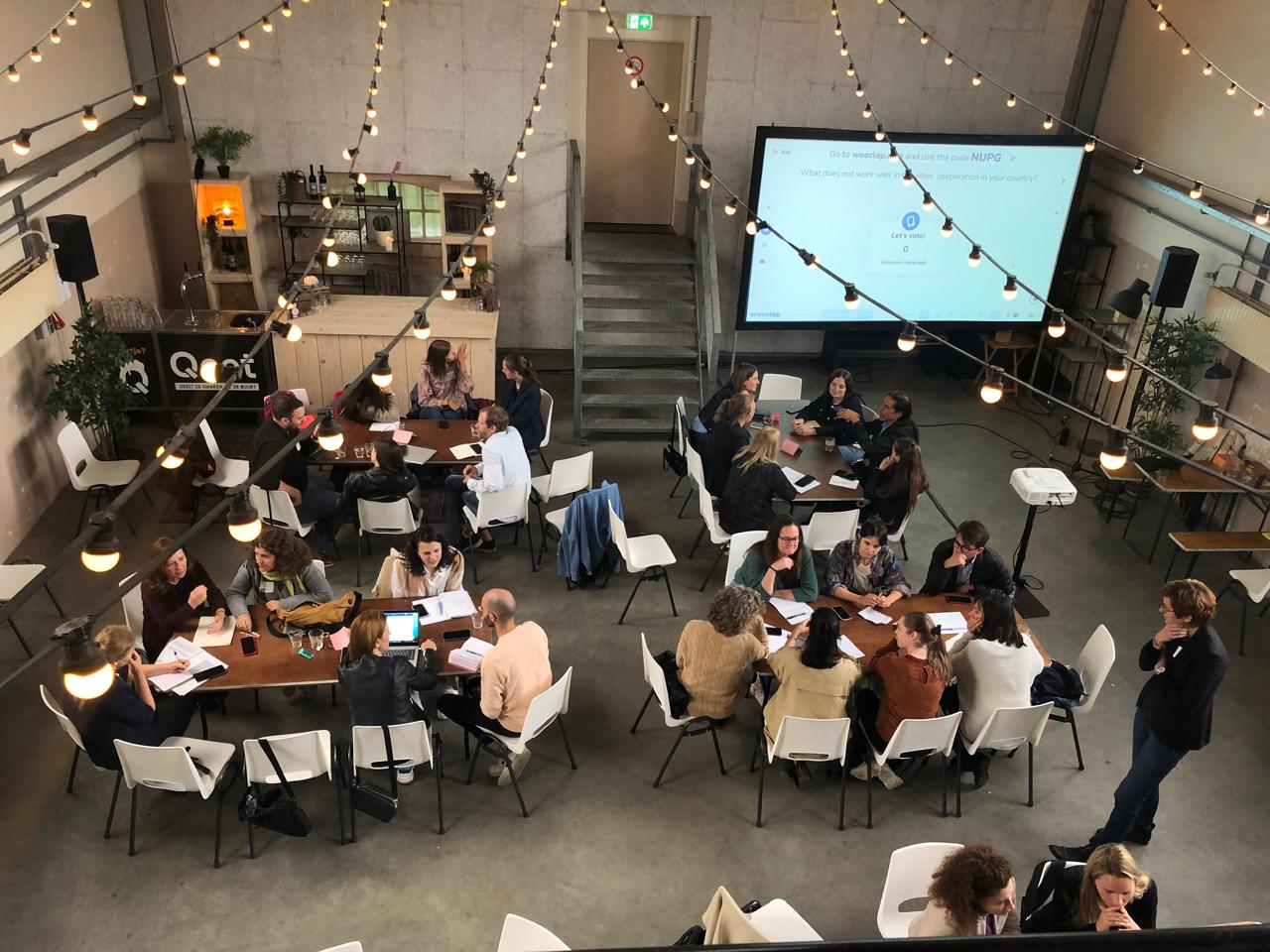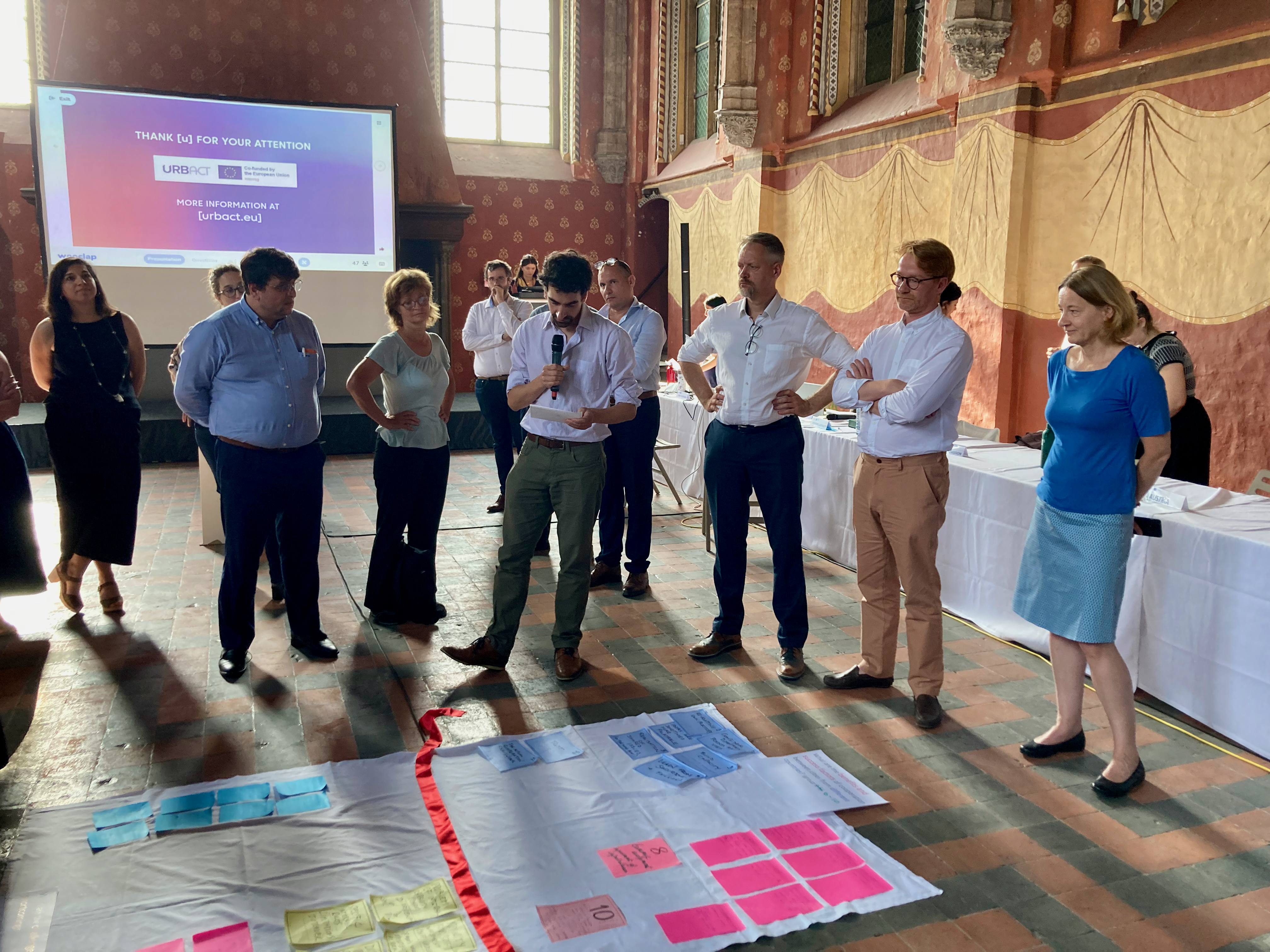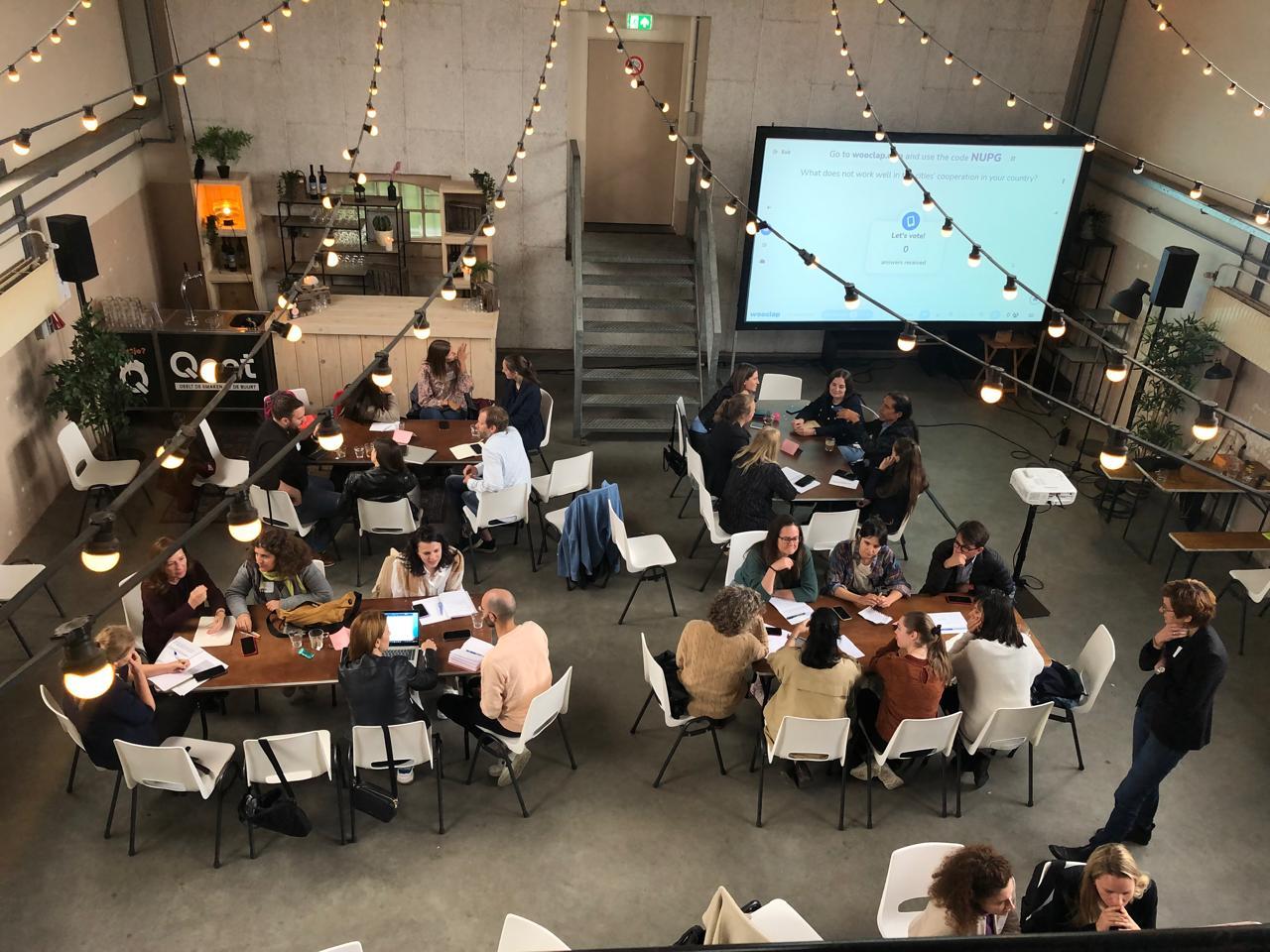The role of URBACT as an INTERREG Programme
INTERREG stands for European Territorial Cooperation and is part of the European Union's Cohesion Policy, which aims to reduce disparities between regions in Europe and provide support for the development of all regions. As an INTERREG programme, URBACT implements the Cohesion Policy at the local level by promoting cooperation and knowledge exchange among European cities. Organized within thematic networks to promote sustainable, inclusive, smart, and green urban development, URBACT supports local action combined with European learning. More than 1,000 cities have already benefited from European funding to learn, exchange, improve skills, and share knowledge.
For the first time, the stakeholder consultation within the Interreg framework is done centrally in the form of a process reflecting on the future Cohesion policy (post-2027). To stimulate this process, the European Commission has invited all European Territorial Cooperation Programmes to join the INTERREG consultation 2024, offering a framework for the programmes to run the consultation in an efficient and cumulative manner. This framework describes a twofold consultation process aiming to gather data and opinions within the specificities of each Interreg Program to prospect the future of Interreg. The two parts involve:
URBACT approach to this stakeholder Consultation 2024![]()
URBACT follows the idea that cities can be both the source and solution to many of today’s challenges and, it therefore brings cities around Europe together to collaborate within networks finding solutions to common problems. That’s why, to contribute to the INTERREG consultation on the Cohesion Policy post 2027 and the future of INTERREG programmes, URBACT invites cities and citizen to share their insights on urban needs, visions for future cities, and the benefits of city-to-city cooperation. URBACT started the consultation with an online survey, running from March 26 to July 31, 2024, and a series of consultation workshops and discussions (June – September 2024). The survey and the workshops series target cities of any size, city representatives, urban professionals, and the general public sharing their views as citizens.
Have a glimpse into some of the consultation workshops that have been carried so far: who joined the discussions and how did the conversations unfold?
Alongside the online survey, a series of consultation events have engaged cities and citizens, especially European youth, and other stakeholders from various levels (programme, national, network, and local) and target groups (general cities, URBACT beneficiaries, and other stakeholders). The URBACT Secretariat is conducting a vibrant mix of workshops and events to gather input from urban stakeholders on cities' challenges and needs, the benefits of city-to-city cooperation and knowledge exchange, and citizens' visions for their future cities. This feedback will shape the future URBACT programme to better meet cities' needs.
In order to follow the URBACT method and to have an integrated, participative approach and action-learning oriented approach to the consultation, the URBACT Secretariat launched a call for proposals and selected a team of experts to support the consultation by facilitating consultation events, analysing the findings and producing the Harvesting Report.
Engaging with URBACT stakeholders at the Programme level:
Along April and June 2024 URBACT has carried out several consultation events to different target groups at different levels. At the programme level, the workshops have included URBACT city representatives, national URBACT points, and members of the URBACT monitoring committee. Keep reading to see some examples of the consultation workshops at the programme level.
Meeting with URBACT Lead Partners & Lead Experts on 15/16 May 2024 in Paris

On May 15-16, 2024 in Paris (FR) URBACT hosted the URBACT Lead Partner - Lead Expert (LPLE) meeting, a key URBACT event at the programme level that brought together urban professionals, city representatives, and experts in urban studies involved in URBACT projects. To profit from the reunion of cities from all over Europe, URBACT lead an interactive 45-minute consultation workshop engaging around 30 lead partners from URBACT action planning networks. The workshop aimed to gather their perspective and experience on cities’ cooperation, the future of the URBACT programme, and participants' visions for territorial cooperation post-2035 (under the Future Cohesion Policy post 2027).
The lead partners did the exercise of imagining “The Cooperation Project of your Dreams” within a journey to the future. Overall, the workshop had the goals of:
Collecting ideas to make the future INTERREG/URBACT programme work more effectively;
Showing the added value of cooperation inside Cohesion policy;
Give a voice to cities and citizens in policy making.
Key findings highlighted the benefits of city-to-city cooperation, including fostering EU identity and learning the good practices from front-runner cities in urban sustainable development, while also identifying obstacles such as language barriers and bureaucratic challenges. The workshop emphasized the need for more immersive exchange experiences, sustainable project funding, and stronger political support to ensure the long-term impact of URBACT initiatives.
URBACT meeting with National URBACT Points on 12/13 June 2024 in Utrecht

URBACT used the occasion of the National URBACT points (NUP) meeting, held on June 12-13, 2024, in Utrecht (NL) to feature an interactive workshop aimed at gathering insights for the INTERREG consultation 2024 on future Cohesion Policy post-2027. Thirty-eight URBACT NUPs engaged in the discussion on the future of the URBACT programme, and the benefit of cities’ cooperation during a one-hour workshop. National representatives first identified pressing urban issues that their cities face, such as energy transition, housing, and climate change.
Subsequent small group discussions explored the challenges of city-to-city cooperation. Reflecting on the role of URBACT as a program facilitating the exchange of knowledge and good practices between cities, National URBACT Points (NUPs) highlighted several benefits of cooperation. In particular, they emphasized the importance of learning about sustainable urban development through “good practices” from different cities, that can be adapted to the local context: "It worked there, why shouldn't we try it as well?". These shared practices not only serve as inspiration and validate ideas that have been tested elsewhere, but they also help convince local authorities and partners to implement them locally. Other successful cooperation aspects included European knowledge sharing and visibility, while suggestions for fostering cooperation emphasized the importance of building a sense of community and EU identity, coherence of roles between national and regional levels, and investing in human capital. NUPs also discussed about the challenges for cooperation, emphasizing the burdens of budget controls from funding opportunities, the need for soft-skill capitalization, and the request for simplified cost options.
Finally, the workshop closed highlighting the role of NUPs as a crucial “bridge” – connecting city to city expertise, the cities to the national governments’ priorities and funding opportunities, and identifying them as key communicators between cities and URBACT in the national and the international context.
URBACT Monitoring Committee meeting on 27/28 June 2024 in Ghent

The last consultation workshop at the programme level, took place during the meeting with the URBACT monitoring committee the 27-28 June in Ghent (BE). The workshop with the members of the Monitoring Committee was a great opportunity to discover the perspective of professionals who have insights and experience from territorial cooperation and the URBACT programme. They brought valuable perspectives from the national level dynamics in their different countries by answering to the following questions from their perspective as national authorities: What are the challenges and shortcomings, as well as the benefits and success factors, of cooperation between cities from different countries? Additionally, what are the challenges and shortcomings, and the benefits and success factors, in the cooperation between cities and national governments?

One of the success factors of cooperation between cities from different countries:
“URBACT framework: URBACT proposes a good and already well-established, formal method/ framework to rely on, that facilitates and legitimizes cities’ cooperation by providing benefits, such as experts and a budget. It presents clear guidelines and expectations from the beginning that facilitate cities’ work to cooperate. Clear expectations from the beginning provide a good guidance for cities”

One major challenge:
“The need to cooperate more, with clearer roles for local and national government”
These are only a few examples of how the MC members contributed to developing a wallpaper with images of what benefits and challenges cities in their countries and what future measures should be taken to achieve urban cohesion.
Involving young citizens in the URBACT consultation
To closely respond to cities' needs, URBACT engages citizens, particularly the youth, in its consultations, recognising that cities and their residents best understand their own needs and visions for their living spaces. Among the different consultation workshops that URBACT is doing, some have addressed the youth specifically. One example of such a workshop is the following:
European Youth Event on 23-26 May 2024 in Brežice (SI)
At the European Youth Event (EYE 2024) in Brezice, URBACT consulted a group of young citizens about the challenges their cities face and how learning from other cities could benefit their hometowns. The Slovenian URBACT National Point facilitated this workshop. Using the theme of travel to spark discussion, participants were asked which city they would like to visit and what they would like to learn or see there to bring back home. Key findings included a diverse selection of destinations and thoughtful reasoning about what to discuss with locals. The participants demonstrated strong awareness of urban issues and solutions, particularly those affecting them directly, and emphasized the importance of youth involvement in urban matters. Most participants, in their twenties, were accustomed to discussing such topics at events, showcasing excellent critical thinking skills and making the facilitation process smooth and effective.
What you can do
Either as a city representative, local authority, or citizen, URBACT wants to hear from you to shape its future programme and better respond to cities’ needs! Therefore, we would like to have your opinion on “The Cooperation Project of your Dreams”, on your ideal city, on the success factors and challenges you see when talking about cooperation and urban development. Go to our online survey to help us shape the future URBACT programme and contribute to the future Cohesion policy (post 2027)!
What is coming next?
The findings from the survey and consultation workshops will be gathered in a report and first discussed with the URBACT Monitoring Committee in October 2024 before being shared with all Interreg programs at the Interreg Post-2027 Autumn Harvest event on November 25-26 in Brussels. By December, the report will be submitted to the European Commission. In spring 2025, the European Commission will unveil initial ideas for the future Cohesion Policy in Gorizia/Nova Gorica (SL/IT). These proposals will be reviewed and discussed by the European Parliament and the European Council for adoption. This consultation process is an opportunity to express yours and your city’s needs, which will be included in the report and presented to the Commission and the EU Parliament to help define European policy. It is a valuable chance to make your voices heard and influence the future of your city and living environment!


